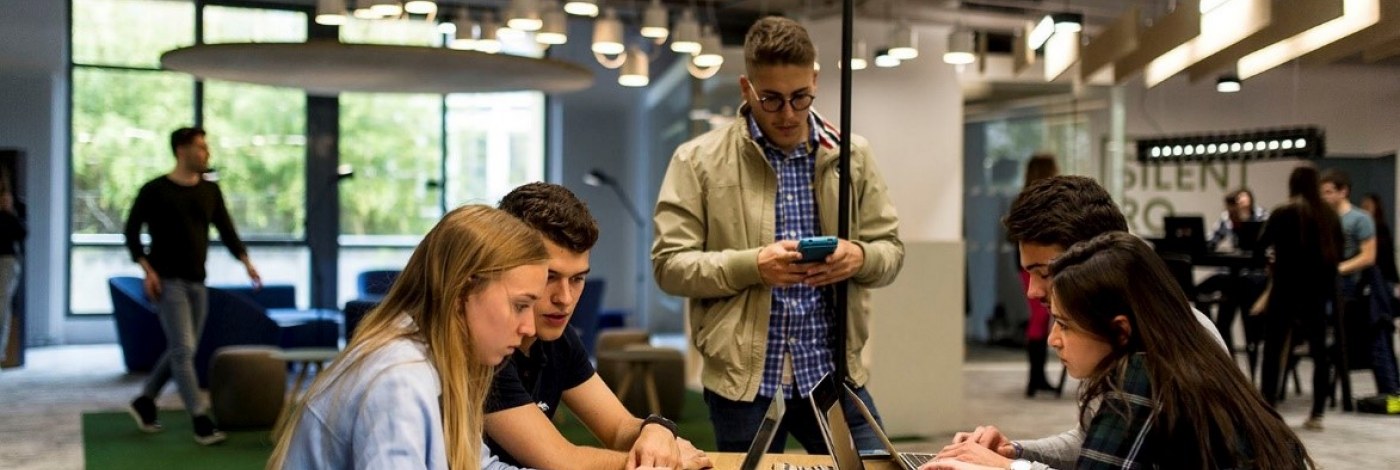Learning doesn’t get more applied than the emlyon business school GIE Kickstarter program. Held at the beginning of the academic year as part of the school’s recently launched MSc in Global Innovation and Entrepreneurship, the program sees groups of four students set up and pitch their own business ventures to potential investors via an online platform. Experiential learning at its best.
“The MSc in Global Innovation and Entrepreneurship, Kickstarter program was set up with the clear objective of giving our students a dose of business reality” begins Professor Rickie Moore, Director of the Master and Associate Dean at emlyon business school. “It’s all well and good teaching the theory and practice of setting up and pitching a business venture but students want and need to practice it in conditions as close to those they’ll discover in their future career. We want them to have fun too via a learning experience that is hands-on, interactive and realistic”. The program operates in a style akin to the US Shark Tank and UK Dragon’s Den TV productions, all operated via an online platform that enables each team of four students to publish and sell their venture to actual business angels and potential investors. A vote is held within each team in order to reach agreement on the product, service or business that they will then devise, a process that involves considerable market research and identification of the existing competition.
An interactive experience
The program has been designed to ensure a high level of peer-to-peer interaction, whereby budding entrepreneurs are having to deal face-to-face (albeit via an online platform) with business creators and investors. For student ambassador and participant Abbas Mouzannar, the benefits of this set-up are plain to see: “GIE Kickstarter makes for an educational experience that is applied and fun at the same time. Teamwork is key and once we get down to business and, above all, start pitching our venture you get a real adrenalin rush. You’re interacting with practicing businessmen and women and receiving direct feedback from those in the know. It’s a steep learning curve and all the better for it”. Prior to the pitch stage of the initiative, each student team develops a value proposition, designs a logo and identity for their project before then uploading their proposal for the next crucial stage – selling their idea to investors and active entrepreneurs with a view to fundraising and crowdsourcing.

Breaking the ice
In addition to the key “learning by doing” takeaway that the program offers, the structure, timing and spirit of the GIE Kickstarter initiative are major positives for all participating students, as Abbas confirms: “given the fact the program takes place right at the beginning of the academic year, it also serves a social purpose as an effective icebreaker between students who are just starting out on the Master of Science and getting to know one another. We are a diverse bunch, coming from educational backgrounds that include Law and Engineering as well as Business Studies. When we get down to business in a team set-up it makes for not just a great experience from an educational perspective but also a really positive way of bonding between classmates. Sure, there is a competition side to GIE Kickstarter but ultimately it brings students together”. In the case of Abbas and his team, their project consisted of a laundry service that operates via a QR code system, a venture that finished in second place. It would appear that the GIE Kickstarter more than whetted his appetite for entrepreneurship as he is currently on an internship at EuraTechnologies in Lille, occupying the position of Start-up Manager and tasked with identifying potential incubated start-ups and coaching entrepreneurs on the pitching process.
Entrepreneurial building blocks
In addition to a clear set of learning objectives, the GIE Kickstarter program was also devised with longer-term professional targets in mind. For Rickie Moore, this is just as crucial as the immediate learning benefits for the participating students: “we are looking to put in place the initial building blocks that will give our students a taste for entrepreneurialism and innovation in the future. By creating so realistic an experience of the reality of pitching a business venture, we not only want them to learn by doing but then go on to apply what the knowledge they have acquired within emlyon in the business world outside. In short, we hope this scheme will provide an initial steppingstone to a career as a business creator”.


